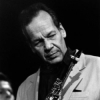Steve Lacy

Steve Lacy
Steve Lacy, born Steven Norman Lackritz in New York City, was a jazz saxophonist and composer recognized as one of the important players of soprano saxophone. Coming to prominence in the 1950s as a progressive Dixieland musician, Lacy went on to a long and prolific career. He worked extensively in experimental jazz and to a lesser extent in free improvisation, but Lacy's music was typically melodic and tightly-structured. Lacy also became a highly distinctive composer, with compositions often built out...
NationalityAmerican
ProfessionMusician
Date of Birth23 July 1934
CountryUnited States of America
If you listen to Louis Armstrong from 1929, you will never hear anything better than that really, and you will never hear anything more free than that.
If you have music you want to play that no one asks you to play, you have to go out and find where you can play it. It's called do or die.
It starts with a single sound. If there's something in that sound, then it's worth continuing.
They call me before they go into production, when they have a prototype, and they call legitimate saxophonists, too. As opposed to the other kind.
You have to sound sad first of all, then maybe later you can sound good.
The soprano turned out to sound to me like the right hand on the piano.
Jazz is like wine. When it is new, it is only for the experts, but when it gets older, everybody wants it.
People don't want to suffer. They want to sound good immediately, and this is one of the biggest problems in the world.
Some people really want to play Mozart and be just performers. I was more interested in invention.
I was spoiled by Monk's music because it was so good, so complete.
I fell in love with jazz when I was 12 years old from listening to Duke Ellington and hearing a lot of jazz in New York on the radio.
When I heard Monk in person in 1955, he was playing with a quartet in a small club. The place was full of musicians, but there was no public at all.
When I first started playing music in 1955, there was just a small body of people that knew it. It was a very esoteric type of thing.
Kenny G, I have to be grateful to him for proving that the instrument can be played all different kinds of ways.